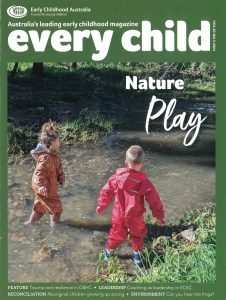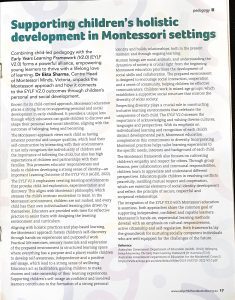Supporting children’s holistic development in Montessori settings
Combining child-led pedagogy with the Early Years Learning Framework (V2.0) (EYLF V2.0) forms a powerful alliance, empowering young learners to thrive with a lifelong love of learning. Dr Etka Sharma, Centre Head of Montessori Minds, Victoria, unpacks the Montessori approach and how it connects to the EYLF V2.0 outcomes through children’s personal and social development.
Known for its child-centred approach, Montessori education places a strong focus on supporting personal and social development in early childhood. It provides a unique lens through which educators can guide children to discover and shape their personal and social identities, aligning with the outcomes of belonging, being, and becoming.
The Montessori approach views each child as having inherent potential and unique qualities, which lead their self-construction by interacting with their environment. It not only recognises the individuality of children and the importance of following the child but also has high expectations of children and partnerships with their families. This promotes educator responsiveness and leads to children developing a strong sense of identity—an important Learning Outcome of the EYLF V2.0 (AGDE, 2022).
The EYLF V2.0 emphasises creating learning environments that provoke child-led exploration, experimentation and discovery. This aligns with Montessori philosophy, which stresses the child’s intrinsic motivation to learn. In the Montessori environment, children are not rushed, and every child has their own individualised learning plan driven by themselves. Educators are provided with time for reflective practice to assist them with designing the learning environment and curriculum.
Aligning with holistic practices and play-based learning, the Montessori approach fosters children’s self-discovery through hands-on experiences and purposeful work. Practical life exercises, sensory materials and exploration of the prepared environment (a structured learning space where everything has a purpose and a place) enable children to develop self-awareness, independence and a positive self-image, which lead to a strong sense of wellbeing. Educators act as facilitators, guiding children to make choices and take ownership of their learning experience. Supporting children’s sense of belonging strengthens identity and builds relationships, both in the present moment and through ongoing learning.
Human beings are social animals, and understanding the dynamics of society is crucial right from the beginning. Montessori education prioritises the development of social skills and collaboration. The prepared environment is designed to encourage social interaction, cooperation and a sense of community, helping children be effective communicators. Children work in mixed-age groups, which establishes a supportive social structure that mirrors the diversity of wider society.
Respecting diversity plays a crucial role in constructing inclusive learning environments that celebrate the uniqueness of each child. The EYLF V2.0 stresses the importance of acknowledging and valuing diverse cultures, languages and perspectives. With its emphasis on individualised learning and recognition of each child’s distinct developmental path, Montessori education complements this commitment to diversity. Incorporating Montessori practices helps tailor learning experiences to the specific needs, interests and background of each child.
The Montessori framework also focuses on cultivating children’s empathy and respect for others. Through group lessons, peer collaboration and communal responsibilities, children learn to appreciate and understand different perspectives. Educators guide children in resolving conflicts peacefully, instilling mutual respect and cooperation, which are essential elements of social identity development and reflect the principles of secure, respectful and reciprocal relationships.
The integration of the EYLF V2.0 with Montessori education is seamless. Both approaches share the common goal of supporting independent, confident and capable learners. Montessori’s hands-on, experiential learning methods dovetail with an emphasis on cultural responsiveness, active citizenship and self-regulation. Both frameworks lay the groundwork for nurturing socially competent individuals who are well equipped for the challenges of the future.
Reference Australian Government Department of Education (AGDE, 2022). Belonging, Being & Becoming: The Early Years Learning Framework for Australia (V2.0). Australian Government Department of Education for the Ministerial Council.


